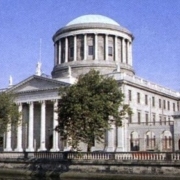RECENT HIGH COURT JUDGEMENT RELATING TO VISA REFUSAL FOR HUSBAND OF IRISH CITIZEN
Justice Phelan of the High Court has recently delivered judgement in the case of S.M and T.A v Minister for Justice [2022] IEHC 611
This case involved a long stay visa application made by the husband of an Irish citizen to join his wife in Ireland. The visa application was refused by the Minister and was also refused on appeal.
The couple challenged this refusal in the High Court by way of Judicial Review.
The couple were unsuccessful in their case before the High Court.
The visa application was refused for multiple reasons. The Court found that the Minister had failed in a number of respects in the assessment of the visa application.
The Irish Immigration Service Delivery consider visa applications in line with a Policy Document on Non, EEA family reunification, December 2016 (https://www.irishimmigration.ie/wp-content/uploads/2021/04/Policy-document-on-Non-EEA-family-reunification.pdf) . Under the terms of this policy, Irish citizens are asked to have earned a certain income within the three years prior to the visa application for their family member. In this case, the Irish citizen sponsor did meet this financial criteria.
Despite this, the Minister found that granting the visa application would likely cost the Irish State money. It was found that the bank balance of the sponsor was low, and this caused this risk. The Court found there had been a lack of fair procedures in respect of the handling of this aspect of the case. The Irish citizen sponsor in fact had savings but had not provided evidence of same as it was not obvious that they would be required when the financial criteria had been met.
The Court also found that the Minister had been incorrect in finding that there had been no explanation with regards to discrepancies on official documents and dates of registration on such documents. The applicant and sponsor had provided explanations. The court found that the correct approach of the Minister should have been to acknowledge that an explanation had been provided, but could then have assessed if this explanation was to her satisfaction or not.
It was brought to the Court’s attention by the applicants that a previous visa refusal has to be declared going forward and can have a negative impact on a person’s immigration history. The Court considered quashing the decision with this in mind, but ultimately held that there was no unreasonable prejudice to the applicants, as they could re-apply providing the documents that were found to be lacking and with new financial documentation. The Court found that this application would be made on better facts and did not believe there was an unreasonable prejudice to the applicant in having to declare a previous visa refusal.
The applicants also brought it to the Court’s attention that the Irish citizen sponsor was pregnant and also the security and safety circumstances in the home country of the sponsor had deteriorated. The Court found that this was not put to the Minister during the application prior to a decision being made and therefore could not be properly found as a reason to find fault with the decision at this stage.
The Court ultimately held that due to the myriad of reasons the application for the visa had been refused, the deficiencies in the decision-making process as specifically identified by the Court did not amount to the decision being unlawful.
The Court held that even if these matters had been handled in the proper way the visa application would still have been refused for other reasons, including a failure to provide specifically requested documents and the quality of some official documentation.
The Court stated that a fresh visa application to address these issues was a suitable way forward for the applicants.
This judgement highlights the importance of providing all requested documents in a visa application, following all ISD published guidelines in respect of documents and attestation of certificates and providing all relevant information in the visa application.
The Judgment also appears to indicate that were an applicant meets the financial criteria of the policy document, it would only be fair that an applicant be put on notice that the Minister intends to refuse the application on those grounds to allow them to address these concerns prior to decision being made.
The full judgment can be found here:
Berkeley Solicitors is highly specialised in preparing and submitting join family visas. Please do contact us if you need advice or assistance with such an application.
This blog article has been prepared on the basis of current immigration law and policy, which is subject to change. Please keep an eye on our blog and Facebook page where articles relating to updates and changes in immigration law and policy are regularly posted.


